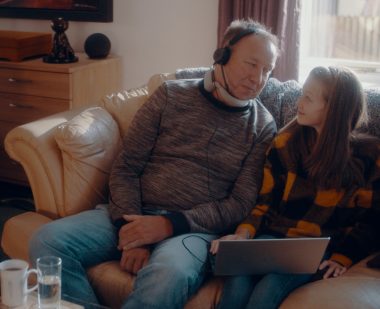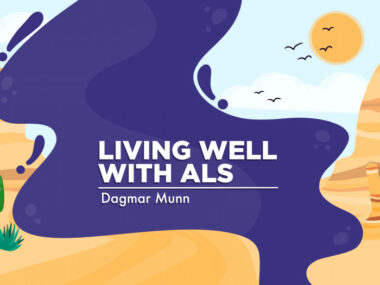‘I Will Always Be Me’ Allows People to Voice Bank With Feeling
Written by |

The title page of "I Will Always Be Me." (Courtesy of MND Association)
A partnership between Rolls Royce and the U.K.-based Motor Neurone Disease (MND) Association is helping people with amyotrophic lateral sclerosis (ALS) preserve the sound of their voices simply by reading a book into a computer.
Called voice banking, the process is a way to record a person’s voice so that it can be heard again after they’ve lost the ability to speak, a symptom of later disease stages.
Voice banking typically works by a having a person speak hundreds, sometimes thousands, of words that can be extrapolated into a voice through machine learning. Using an application, patients who’ve lost the ability to speak, or to speak easily, can then type a sentence or paragraph that a computer synthesizes and reproduces digitally to approximate their natural voice.
The partnership’s project, named “I Will Always Be Me,” employs a different take on voice banking. For it, people make a recording of themselves reading out loud a short, illustrated storybook of the same name that they’ll send off to be processed digitally and expanded for later use.
The project is a product of the Next Generation Think Tank, which was started in 2019 by Stuart Moss, the head of IT innovation at Rolls Royce — whose father, Brian Moss, died of ALS complications on Christmas Day in 2014 – along with Nick Goldup, director of care improvement at the MND Association, and Peter Scott-Morgan, PhD, an association trustee who is living with MND.
An easier way to stay ‘present’

Alan Towart reads “I Will Always Be Me” with his daughter, Sophia. (Courtesy of MND Association)
For Alan Towart voice banking is a way to still be present in things.
“You don’t want to be the person who’s forgotten about because you can’t communicate,” said Towart, 50, who was diagnosed with ALS five years ago.
“You need to be able to have a voice,” said Towart, who lives in Cumbria, England, with his wife and daughter, Sophia.
The program had its official launch on Feb. 15. As of last month, there have been more than 10,000 visitors to the site and 394 people have registered to bank their voices.
The MND Association will cover the cost — a reduced version of the normal £175 (about $216) to £300 (about $370) fee — for patients living in England, Wales, and Northern Ireland. MND Scotland pays for the service for patients there. International patients will have to pay £200 to participate, but plans to expand “I Will Always Be Me” beyond the U.K. are in the works.
Voice banking has been around since the late 1990s, though innovations in artificial intelligence have improved its accuracy and speed. But the process can still take hours to record and months to complete, and some companies require up to 3,000 phrases to create a person’s digital voice.
“I Will Always Be Me” is designed to make voice banking a little more user-friendly.
“We carried out a survey back in 2018 and it was taking people an average of three months to bank their voice,” Goldup said. “So this process is just so much easier for people — they can do it in 20 minutes or 25 minutes and job done.”
Speak Unique, the company tapped to collect, synthesize, and bank voices as part of this collaboration, collects recordings of patients reading the same online picture book about a person whose body is changing because of ALS. Through text and animation, its author Jill Twiss and illustrator Nicholas Stevenson show that, despite physical changes, a loved one with ALS is still the same person they’ve always been.
Towart began to bank his voice shortly after his diagnosis, but found the process then available difficult. He needed to say about 1,600 words or phrases and would often have to re-record. He eventually stopped altogether.
“I think I ended up recording about 350 of the phrases, and then pretty much parked it because I had more important things to go on with,” said Towart, who can still speak without using his digitized voice. “People with a diagnosis of MND or ALS, they don’t know how long they’ve got, and I just wanted to make the most of the time I have.”
This is not the first voice banking project to come out of the Think Tank. Rolls Royce, Dell, Intel, Computacenter, and Jabra updated a service last year called Voice Banking in a Box, which sent a recording kit to ALS patients free of charge, according to a press release. It took patients about an hour to complete.
Through Think Tank, the MND Association also assisted Google’s Project Euphonia, which is using voice-activated technology to refine slurred speech and make it easier to understand.
Capturing feelings, not just phrases
“I Will Always Be Me” is an iteration of Voice Banking in a Box, and is focused on making the user’s experience of recording themselves for voice banking smoother. That’s where the storybook comes in — to make the recorded phrases relatable and shorter. People with ALS like Towart know are on a race against the clock. He can still walk short distances, though his right arm isn’t working as well as it once used to, he said.
The book’s story speaks to readers who are losing their physical abilities, and it conveys the emotions that people undergoing such loss may feel. Toward the close of the book, Twiss, an American author, writes:
“Yes, everything is changing.
But I will always be me.
And I will always love you.”
Goldup said he was initially worried that reading with emotion might make it more difficult to record someone’s voice; that the emotions being expressed would affect voice quality. That turned out not to be the case. According to Speak Unique, the reader’s depth of feeling helped the company develop a better version of their voice.
“That worked in our favor because when we talk, we have emotion in our speech, and so to capture that is so much better than just reading a script,” Goldup said.
Sue Mogford, 73, from Leicester, England, was diagnosed with ALS in July. In her reading, she intends to change some words around so more of her personality can be reflected in the recording. Instead of hating “wet socks,” as the book reads, she says she’ll say something she hates more — cold feet.
Mogford, who attempted voice banking before but was disappointed with the results, said the book adds an emotional aspect to the recording that general phrases could not.
“It’s nicer, the book, because you’re talking about how you feel, you know, what’s happening,” she said.
Towart said he wants to make another recording to better reflect his northeast English accent.
“I think I’m going to try and do it again, but put less emphasis on speaking fluent English,” he said. “And maybe just try and try and be more me, just as the book says.”
Darryl Adams, director of accessibility at Intel, called “I Will Always Be Me” a start toward bringing voice banking technology to ALS patients who otherwise wouldn’t have access to it.
“There’s a lot that still needs to be done to sort of fully democratize this in terms of anyone who needs this capability should have it,” Adams said. “And so it needs to be inexpensive, it needs to be simple … and it should also be easy to integrate your voice so your computer can speak for you.”





